- Home
- Lynne Truss
Get Her Off the Pitch! How Sport Took Over My Life Page 6
Get Her Off the Pitch! How Sport Took Over My Life Read online
Page 6
Then came England v Scotland. This time, the paper wanted me to watch footie in a local Brighton pub - and, as I write those words, I do start to think it was all a plot to destroy me, after all. They gave me some spending money in an envelope, and suggested a small, murky pub, forgetting to tell me that I needed to start camping out in front of its giant screen on Friday night if I wanted to have any chance of a seat for the match on Saturday afternoon. Robert and I arrived 90 minutes before the match, and the bar with the TV was already crowded with professional layabouts ordering beer in enormous pitchers and crisps by the box. All the seats were taken, and most of the floor space was taken, too. It was hard to see the attraction of watching footie in a pub - especially when the match was being broadcast on terrestrial television and therefore available in one’s own home. The only interesting novelty in the experience, as far as I could tell, was the stickiness of the floor, which meant that, however roughly one was barged from the side, one could always regain the vertical. The screen was dreadful - a blurry, washed-out picture; meanwhile the half-light was a pickpockets’ charter, the crowding was ghastly, the air was full of cigarette smoke, people were already quite rowdy, and worst of all, you couldn’t hear the telly. How was I supposed to take detailed notes in these conditions? Someone really hadn’t thought this through.
But there was something behind my grumbling, I realised. Something unexpected. I was tense about the football. A match was about to take place, the outcome of which might be decisive for England’s progress through the tournament. Suddenly the previous Saturday’s 1-1 result against Switzerland looked like a wasted opportunity: why hadn’t England played better, tried harder, got more goals? Hadn’t they understood what was at stake? Hadn’t they had a couple of years to prepare for that match? With an hour to go before England v Scotland, I felt sick. The pager had sent me a message on the Friday with, ‘Pressure on England and Scotland to win tomorrow’, and I had thought this a bit superfluous, but now, as I waited grimly for kick-off at 3 p.m., I hated the fact that, yes, both teams really needed to win this if they were to survive the group stage of the competition. Scotland had only one point; England had only one point; The Netherlands had three. England was to meet The Netherlands the following Thursday at Wembley, and that was the last of the group matches. In less than a week’s time, before the knockout stage started, England might actually be out. ‘Come on, England!’ someone shouted across the pub - and this was half an hour before the match, you understand. But it didn’t seem such a banal thing to say, all of a sudden. ‘Come on, England!’ does sum up one’s feelings in this situation pretty well. I tried to unclench my jaw, but it was hopeless. I tried to take an inhalation of breath without choking, but that was hopeless, too.
It turned out to be truly a game of two halves, that Scotland game. The first half, watched from that ghastly pub, was pure, goal-less misery; by the end of the 45 minutes, I’d had enough, and so had Robert. At half time we made a dash along the sea-front - all ozone, seagulls, energy and sunlight - and threw ourselves into a light, colonially decorated bar in one of the big hotels where the screens were of a normal TV size, and awkwardly bolted to the ceiling, but at least we could sit in upholstered white wicker chairs and hear the commentary. It was here that we saw the England team score its two goals against Scotland - and David Seaman save the penalty from Gary McAllister, don’t forget, which was just as momentous (they said it was the first penalty saved by an English goalkeeper at Wembley since 1959). Gascoigne’s tremendous, genius clincher - flipping the ball over Colin Hendry’s head, dodging round him, and then volleying from some distance into the net - is one of the greatest ever moments of three-dimensional football, only slightly ruined by the way it’s followed by him lying on the ground with his mouth open for the ‘dentist’s chair’ goal celebration (a highly contrived reference to the England team’s recent drinking excesses while on tour in the Far East). I’m always disappointed by that rush of Gazza’s to assume the dentist’s chair position. All that beauty and spontaneity followed immediately by something so yobby. It perfectly encapsulated Gazza’s tragic misfortune: that the downside to having a foot like a brain is that you get a brain like a foot, to go with it.
The following Thursday, it was England v The Netherlands, the last of England’s group games. The championships had been going for only 10 days. Against all expectations (and precedent), England beat The Netherlands 4-1. It was a historic night for English football. I watched the match from an airship circling Wembley Stadium. No one ever believes me when I tell them this. They think I am making it up.
It does sound suspicious, I admit. Why did the Fuji airship people offer The Times a place on board that evening? Well, who cares? My orders were to arrive in the early afternoon at a field near Woking, bringing a fearless friend if I wanted to. My friend Susan brought a straw hat and a pair of binoculars (clever). I brought the pager and some chocolate cake. A freelance photographer joined our party - but, aside from the pilot, that was it. Nice men from Fuji’s German publicity operation met us and showed us the silvery airship as it rested in long, parched grass. A warm breeze rippled the tops of trees. All was peaceful. Susan and I asked intelligent questions about how the airship had flown here from Germany, what was its exact length, weight, age, mix of gases, pet name, number of flights, and so on - and basically tried ever so, ever so hard not to mention the Hindenburg.
In the end, sensing our English reticence, they mentioned it themselves. All thoughts of the Hindenburg were to be banished from our minds, they said; the canopy of a modern airship was emphatically non-flammable. The worst that could happen with a damaged modern airship was a very, very gentle descent, landing with a soft bump, probably somewhere open and safe and absolutely lovely like the middle of Richmond Park. Our American pilot, whose name was Corky (how marvellous), had flown airships round Superbowls hundreds of times; and so confident was he of the non-flammability of the vast, gas-filled canopy that he actually chain-smoked at the controls. The only thing we had to be prepared for, Corky said, was that being in an airship gondola was less like flying; more like sailing. Thermals made the ship both pitch and roll, especially in the full heat of a June day. He didn’t add that, at the same time, there is a deafening noise from the propeller, and no bathroom. (We would find these things out soon enough.)
At 4.30 in the afternoon, a small team of German men in white boiler suits, four on each side, shouldered the nose ropes and solemnly walked our lighter-than-air dirigible to its launch position. It was a heart-stoppingly dignified operation. I felt there should be some Bach playing, and that they should be wearing powdered wigs. Then they let go of the ropes, Corky started the engine, and we lifted off. The instruments of an airship turn out to resemble those of H.G. Wells’s time machine - a bicycle wheel for a rudder; cotton reels on bits of string for adjusting the mixture of gases; pedals for something or other (presumably not brakes). Reassuringly, however, Corky had state-of-the-art headphones with radio contact to air traffic control, and at no point took them off in order to change into a Phileas Fogg top hat.
‘Move about if you like!’ he shouted to us over the engine noise. ‘Open windows!’ I discovered that I felt instant nausea if I looked at the ropes hanging from the unseen canopy’s nose in the middle distance - so I sensibly stopped doing it. The aforementioned pitching and rolling, as we made our way north-east, then north above such landmarks as Epsom, Croydon and Wimbledon, made moving about quite difficult, but we survived quite well in the circumstances, with our stomachs knocking against our ribs. An astonishing number of houses had identically-shaped swimming pools, by the way: if you were a swimming-pool salesman with the Surrey concession, the view would have made you very proud. Anyway, Susan firmly declined the chocky cake, but was otherwise OK, as was the photographer (who found the chocky cake very acceptable). Evidently a TV puppet called Otis the Aardvark had been copiously sick on a previous flight, which we all found completely hilarious.
We coul
d see Wembley from miles away. There is a wonderful Dickensian passage at the beginning of Patrick Hamilton’s novel The Slaves of Solitude describing wartime London as a great, breathing monster, sucking thousands of tiny people in through all the train terminals in the morning, and breathing them out again at the end of the day. This passage came to mind as we arrived over the great white stadium, which was drawing people towards it from far and wide on this light summer evening. Why doesn’t TV use more aerial shots? It’s such a missed opportunity. Of course, such shots would be easier to achieve if the airships could be stationary - which they can’t: they have to keep circling, circling, circling, circling, otherwise they die, like sharks. But the view is phenomenal: 75,000 people assembling in one place for a sporting contest is a grand sight. The grass is incredibly green. The fans are (in this case) a beautiful white and a beautiful orange. Thousands of individual camera flashes make the scene sparkle. Once play starts, the 20 free-flowing outfield players spread and converge restlessly, like droplets of mercury being tipped about on a mirror - or like droplets of mercury all in mindful pursuit of a moving ball, anyway.
We were told we were flying at around 1,000 feet, but I don’t know whether that was true. We could open the windows and lean out; we could see the players not quite well enough to identify them individually. And of course we had to keep re-orientating ourselves because of the non-stop circling. England are playing left to right. No, hang on, England are playing right to left. No, I was right the first time: England are playing left to right. But when the ball was destined to fly into the net (as it was four times for England in the course of that astonishing evening), seeing it from directly above was the best view you could possibly have.
What people tend to overlook about that generally well-remembered England-Netherlands match, actually, is how nice and varied the goals were for anyone watching from overhead. First, there was the penalty in the first half - which helpfully got us used to the sight of a white ball punching into the back of a white net and dancing there. A chap in white (Paul Ince, as it turned out) appeared to trip on the edge of the penalty box, and play was suspended. Players stood back to watch while another chap in white (Alan Shearer, as we later learned, courtesy of the pager) placed the ball on the spot. Up in the airship, we were bloody excited. Above the roar of the engine, we could hear the cheering from the stadium - but, truly, only just. It was like watching through the wrong end of a telescope. There was a run-up; the ball was smacked into the corner of the net, and the jubilant little ant-sized player ran off at top speed while we danced about in our little gondola, and Corky made his mind up to stay for the second half - which was a relief, as his instructions had been to leave Wembley at half time and get us back to Woking before dark.
The rest of the first half was highly absorbing, by which I really mean unbearable. The Dutch kept getting corners; players increasingly smacked into one another on purpose; the daylight started to give way to floodlight; cameras flashed; the score remained 1-0. Chocky cake was no longer of interest. The only thing that mattered was the puzzle of how to get that ball from one end to the other, using only white players, and finally knocking it past the chap guarding the net. Tactics were wonderfully clear from the air: you could see how a goal attempt was made; how a defence could be divided and defeated. The picture that eventually appeared with my piece, incidentally, was one of the first taken that night - about an hour before the match even started. It was in black and white, and showed the stadium half-full. The novelty was that the photographer was sending his pictures digitally from the airship via his computer and mobile phone, which was pioneer technology in 1996. The battery on his computer allowed him to send about three pictures before it ran down. It was such a shame. The picture did nothing to capture the thrill of being in a small but very airy room with a view of that glowing arena surrounded by eerily deserted - and ever-darkening - parks and gardens and streets.
The three England goals in the second half were all as fabulous from an aerial perspective as I’m sure they were from the ground. The first came from a corner: Gascoigne (it turned out) delivering a high, high ball into the thick of the English heads in front of goal, and then - bang! It was in the net. Having no access to replays, we didn’t quite believe what we’d seen; it was so very quick and efficient. But we heard the cheers, and then the pager told us it was Teddy Sheringham who’d scored, and it was now 2-0, and I explained to Susan why it was a nice thing that Sheringham had done it, as this was his first goal in the competition, and she patiently put up with this bizarre instant-expertise stuff because she could tell I was excited. By this time Corky was on borrowed time, and we knew it, but we kept very quiet as we didn’t want to jog him out of the circling - which I ought to mention had momentously reversed direction at half time.
What of the third goal? Well, it was marvellous in, again, a different way. This one was all about (yes!) getting the ball from one end of the field to the other using only white players and resisting the temptation to just knock it a long way forward and hope the right chap got to it first. It was a glorious bit of dynamic teamwork, magical to see, and it culminated in three attackers ranged in a line across the goal, with Gascoigne (as I now know) passing it immediately right to Sheringham; and then Sheringham tricking everyone by neatly side-footing it right again to Shearer, who had a clear shot at goal. Even the photographer started to get excited at this point. England had never beaten the Netherlands in any European Championships before, or in any World Cup either, apparently. The score now stood at 3-0, and we couldn’t help wondering, if you dropped a piece of chocky cake onto the pitch from this height by way of celebration, what would happen? How soon would it reach terminal velocity? Would it disintegrate? Or maybe form itself into a perfect sphere, on the same physical principle used in the manufacture of lead-shot? Or, if it landed - whump! - on Dennis Bergkamp’s head, could it possibly knock him out? After all, by the time the police could work out what had happened, we could be miles away, possibly over the Channel.
I will always be grateful to Corky that we saw the fourth England goal before we had to tear ourselves away that night. Again it was different; again it was beautiful, and somehow pre-ordained. A great surge from England culminated in the somewhat useless Darren Anderton taking a running shot at goal, which was deflected by the hapless Dutch keeper (Edwin van der Sar, whose name, at the time, meant nothing). The loose ball was picked up with lightning speed by Sheringham and there it was again - bam - back of the net, 4-0, glorious. Now we could hear the cheering, all right. But we really needed to get going, as there is a quite sensible law about flying airships over London after dark, and we had to get back to Surrey rather sharpish. Corky put on an astonishing lick of speed, shooting us back across London, across the river, over Putney Heath and Richmond Park, down the A3. We were all exhausted but extremely happy as we watched the darkening - and somewhat misty - landscape pass beneath us, and realised with a certain alarm that we were keeping pace with cars on the A3 travelling at 50 miles an hour. But it had been magical. I found myself humming ‘Lift Up Your Hearts’ for the first time since school, and waiting for the inevitable show of emotion from the pager, to see if it matched my own.
We landed back at Woking and were greeted by the chaps in boiler suits. When the engine was finally switched off, it was like having someone take a nail out of your head: for the next few days I was so sensitive to motor noise that I jumped in the air whenever the fridge started up. But what a great night to be converted - finally - to football. Three weeks earlier, I hadn’t heard of Alan Shearer. Now I wanted to have his babies. Three weeks earlier, the mind-altering experiment had seemed quite harmless and (at worst) reversible. Now the damage was done. I had learned to cheer and grumble, love and loathe. During the England-Spain quarter-final a couple of days later, I stood there at Wembley wringing my hands in misery at how badly England played. ‘Why are you passing it to Gascoigne?’ I yelled (he was on terrible, dozy form that day). ‘You might
as well pass it to the cat, son! You might as well dig your own grave and jump in it!’ England survived that quarter-final, although we all knew they didn’t deserve to. But the following Wednesday, when England lost on penalties to Germany in the semi-final, I was all the more blank with grief, all the more inconsolable. I felt that I had been with our boys, in some sort of spiritual, eternal way, through the extremes of thick and thin.
It was impossible to imagine how Euro 96 might have passed entirely over my head, had I never had that lunch with Keith and David. Might I have heard the news of England’s defeat with complete unconcern? God knows. Plenty of my friends certainly took no notice of Euro 96 and were blithely unaffected by its outcome. All I know is that, on the morning after England-Germany, I slung the food into the cat bowls and went back to bed to stare at the ceiling. No light-hearted songs today, kitties. No bath-running or kettle-boiling during the sports bits at twenty-five past the hour, either. On the contrary: I turned up the volume for Garry Richardson and cried softly onto the pillow, while desperately figuring whether - if I rigged it up to the mains and stood in a bucket of water - I could use the pager to kill myself.

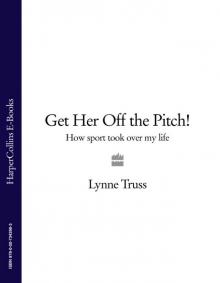 Get Her Off the Pitch! How Sport Took Over My Life
Get Her Off the Pitch! How Sport Took Over My Life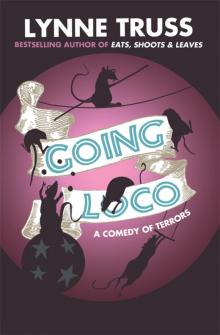 Going Loco
Going Loco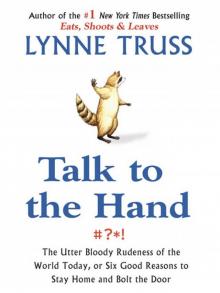 Talk to the Hand
Talk to the Hand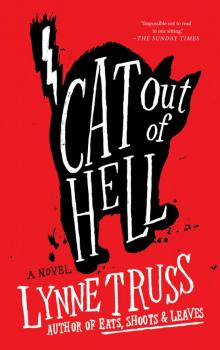 Cat Out of Hell
Cat Out of Hell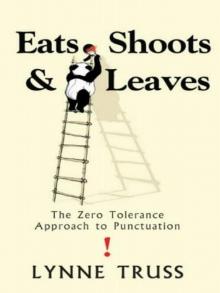 Eats, Shoots and Leaves
Eats, Shoots and Leaves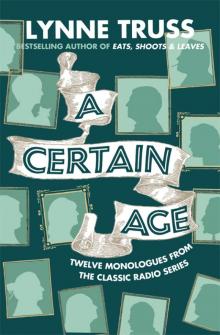 A Certain Age: Twelve Monologues From the Classic Radio Series
A Certain Age: Twelve Monologues From the Classic Radio Series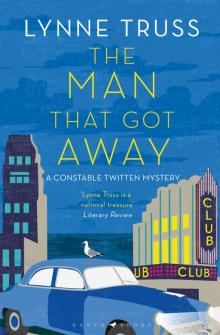 The Man That Got Away
The Man That Got Away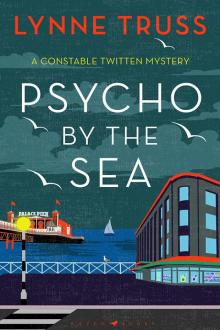 Psycho by the Sea
Psycho by the Sea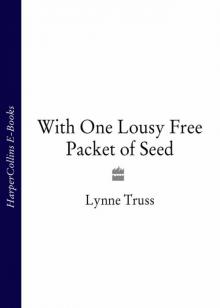 With One Lousy Free Packet of Seed
With One Lousy Free Packet of Seed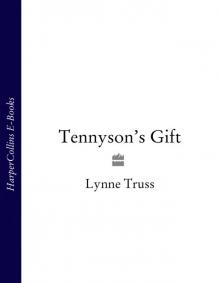 Tennyson's Gift: Stories From the Lynne Truss Omnibus, Book 2
Tennyson's Gift: Stories From the Lynne Truss Omnibus, Book 2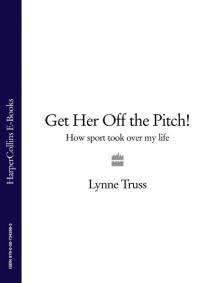 Get Her Off the Pitch!
Get Her Off the Pitch!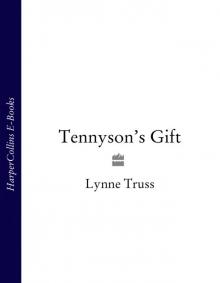 Tennyson's Gift
Tennyson's Gift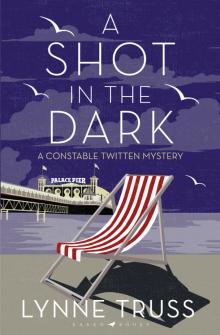 A Shot in the Dark
A Shot in the Dark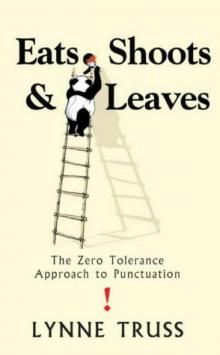 Eats, Shoots and Leaves: The Zero Tolerance Approach to Punctuation
Eats, Shoots and Leaves: The Zero Tolerance Approach to Punctuation